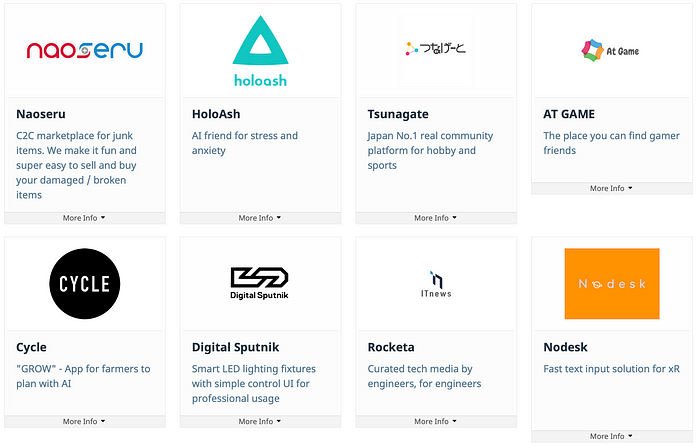
Why Japan needs more tech founders?
To answer that question, I am really excited to be sitting down today with Shin Iwata, founder and CEO of Miraise, a seed fund exclusively focusing on engineer-led startups.
Now if you’re wondering what such a fund mean, a quick trip to their landing page will give you a very clear answer:

I’d been meaning to interview Iwata-san since our very first discussion about a year ago, and I must admit: it did not disappoint. From that very first encounter, I felt we shared a common vision about the direction that entrepreneurship in Japan should take, and that tech founders were bringing a unique viewpoint to the table. But what is amazing about Iwata-san is that he can explain why, from a cultural, behavioral and historical aspect.

Our call unexpectedly started with a deep-dive into the various applications that Miraise is supporting. As a matter of a fact, the call itself was done through one of those platforms: in these strange times, oVice aims to recreate the office atmosphere by enabling not only regular meetings, but also conversations at the coffee machine, overhearing discussions across the office space, and seeing employees move around the office.
The second tool I discovered shortly after was Mattermost: not Miraise-backed, but an open-source version of Slack: “We use it to interact with our community and support our founders — Slack is just too expensive”. And with these first five minutes, I knew it would be a fun interview!
Tech founders are the future
Thanks a lot for your time Iwata-san! To get started, could you tell us a bit more how the idea of a “fund for engineers” came to you?
I used to see a lot of Japanese products when I was traveling abroad back in the days. And today when I look at all of the tools I am using on a daily basis, I am left wondering: where did all the Japanese-made products go? What happened to Japan? (laughs) That is how and why Miraise started.
Before launching Miraise, I dove deep into history, to try and answer that question. I discovered that a lot of Japanese’s most famous companies were initially founded by engineers: Honda, Toshiba,… But 40 or 50 years later, these companies are now led by people who have been promoted internally, and in many cases they’re not engineers.
“Engineers are very good at selling products they believe in — they cannot tell lies, and they know how to evangelize.”
I then looked at the US, and realized that a similar thing happened in the Bay area over the past 20 years, but for software instead of hardware. All these companies that are now leading the world, Google, Amazon, Zoom, they’ve been founded by engineers. We do find the same in Japan, but in much smaller numbers: Mercari, Mixi, Smartnews, Hatena… Again, all founded by engineers.
Engineers are very good at selling products they believe in — they cannot tell lies, and they know how to evangelize. They also understand the value of win / win deals. APIs are the perfect example of that: I give you access to my service, and you “take care” of promoting it. In short, we believe that tech founders acquiring business skills is more natural than the opposite.
Lastly, an aspect that’s perfect to convince potential investors is the ROI. And again, looking at factual data: the IPO amount is much larger for tech founders than non-tech ones (Iwata-san mentioned they will be publishing a report about this finding in May 2021). So looking at all this, we came up with Miraise!
The 文系 vs. 理系 worldview
That’s a thorough analysis! Any other aspects you found out during your research?
To understand the state of entrepreneurship in Japan, you also need to understand the 文系 (bunkei) vs. 理系 (rikei) worldviews. After second grade of high school, students here have to pick a side: sciences (probably what we would call STEM) or humanities. It’s true in other countries too, but in Japan this separation is even stronger. Both sides do not really “talk” to each other, and after a while, people on either side tend to believe they are bunkei or rikei. Basically, they will say “I am bunkei” or “I am rikei”, and they will assume that they can’t do the other side.
This is one of the main problems that Japan met in the software era. In the hardware era, you needed engineers, people to manage engineers, and people to sell your products. So companies used to have a R&D department, which was perfect for rikei folks, and marketing people (aka bunkei) would figure out how to sell the innovation created. Companies could afford to pay for researchers, who themselves were happy to have lifetime employment, and then marketers would sell whatever researchers would build.
“Today, technology has become an enabler rather than the seed of the product.”
Today is very different. Business, management and technology have to be combined. In the software era, most solutions are born from a problem: we need to figure what’s the problem, and how we can answer it with tech. So technology becomes an enabler rather than the seed of the product. And with that new paradigm, a CEO who doesn’t understand tech cannot efficiently run a company. But most CEOs in Japan do not understand tech, and they use that “I am not rikei” excuse. Similarly, Japanese engineers think they don’t have what it takes to start a company… As you can guess, they say “I am not bunkei”.
The investor side
Thanks a lot for the insights — So what does that mean from an investor’s viewpoint?
In short, it means that investors in Japan also need to adjust. I think being a good VC requires two skills in addition to regular VC skills such as finance: operations (i.e. running your own company) and engineering, especially if you’re planning to invest in tech. And here again, an issue is that most Japanese investors don’t match that profile.
“When we decide to invest in a startup, we also have a precise template to support them, which we can replicate.”

Now what does that mean from an investment viewpoint? As a VC at seed stage, you should be looking for startups with a 100x potential, and only tech products with potentially exponential growth can offer that. The thing is, it’s extremely hard to evaluate a tech company at seed stage if you’re not an engineer, and engineers are also terrible at pitching because they did not have much chance to practice it yet. The result? VCs without an engineering background have a bigger probability to miss high potential tech companies.
That definitely makes sense. How are you trying to address that with Miraise?
Supporting tech founders as a non-tech investor is difficult. At Miraise, since both my cofounder and I are engineers, we understand what engineers struggle with. So when we decide to invest in a startup, we also have a precise template to support them, which we can easily replicate.
Agile is also not fully understood in Japan just yet. We were really good at waterfall development, i.e. making exactly what’s written in the specs. But with Agile, you expect users to share their feedback to improve your product, and consumers do not believe that their voice can change something. The mindset from consumers is still: why do I need to help you? When I was working at Lotus Notes, I had to start a beta tester community for Notes Pump, and I feel I understood the power of users feedback back then.
What’s next for Miraise
Thanks a lot for the deep-dive into the world of tech investment and Japanese startups! So what’s next for Miraise?
One of the things that Miraise has been focusing on since its inception is the Founders Community. It started from the observation that daily challenges faced by founders, especially engineer-founders, cannot be answered by a Google search. We found that fostering a peer-learning environment is the best way to address that challenge, and we created an online community powered by Mattermost. All our founders are required to actively participate in this online community.
“At Miraise, we believe in the explosive power of an engineer awakening as a CEO”

To further develop peer-learning, we also launched an internal program last year called “Booster”, which is an intensive 100-day mentoring program for our portfolio companies. During that program, founders take a step back from their product development work to participate in group sessions and give feedbacks to each other.
We truly believe in “the explosive power of an engineer awakening as a CEO”, and we are building the best environment to enable that: with our online community, Booster program and monthly meetups, we are positioning ourselves as the go-to fund for engineer-founders.
Thanks a lot Iwata-san for your time and for the great insights! 🙏
